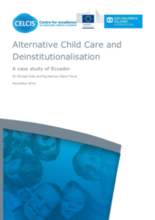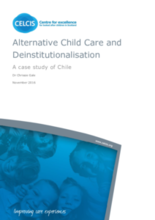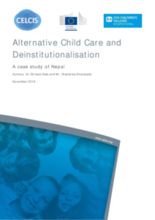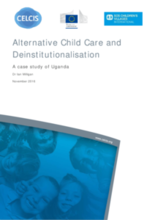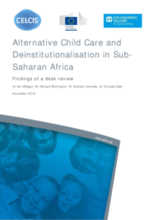Demographic Data
|
Sources: World Bank, UNICEF, UNDP HDR 2015, DHS 2011 |
Displaying 10131 - 10140 of 14391
This document discusses the means by which the Council for the Administration of Criminal Justice and Youth Protection in the Netherlands (the Council) can provide the highest level of protection for children placed in the intercountry adoption focus group.
This issue brief from the UNHCR highlights key messages from UNHCR in regards to family tracing and reunification. The brief outlines the importance of children growing up in a safe family environment and the positive impact this has on a child's psychological, cognitive and physical development. In the best case, alternative care is only required as an interim measure while family tracing is carried out and until the time when children can be reunited with parents or family members.This brief is part of a series developed by UNHCR which aims to guide field operations on key thematic child protection issues.
The European Commission Directorate-General for International Cooperation and Development (DG DEVCO) commissioned SOS Children’s Villages International to undertake case studies of arrangements for ‘alternative child care’ in six non-European countries across three continents to help inform the EU’s future strategy for provision of support for children in countries outside Europe. This report is a case study of one of the six countries, Ecuador.
The European Commission Directorate-General for Justice and Consumers commissioned SOS Children’s Villages International to undertake case studies of arrangements for ‘alternative child care’ in six non-European countries in three continents to help inform the EU’s future strategy for provision of support for children in countries outside Europe. This report is a case study of one of the six countries, Chile.
The overall purpose of this study is to present an ‘introduction’ to alternative care systems in Central and South America (CSA).
The European Recommendations on the implementation of a child rights-based approach for care professionals working with and for children highlights the steps to be undertaken to develop a child care service workforce capable of applying a child rights-based approach to their work.
This paper is an attempt at rethinking the systemic problems facing the funding and commissioning of care services and placements for children in need of care and adoption, across ALL types and specialisms of placement, from kinship care, through foster care, to residential care and adoption.
The report investigates why children are placed into alternative care, what types of alternative care are available in Nepal, what structures and processes govern alternative care, how the alternative care workforce are trained and supported, and what is and is not working in Nepal's current system. It concludes with recommendations for enhancing alternative care in the country.
This report is a case study on alternative care arrangements and deinstitutionalisation in Uganda.
This desk review provides a brief mapping and summary of existing knowledge on alternative care and deinstitutionalisation in Africa.



